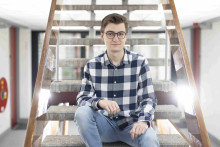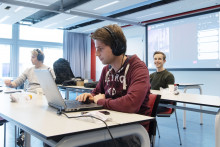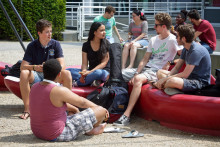At the end of August, Martin Mikšík came to Twente to study Business Information Technology (BIT). He left from Brno, the second largest city in the Czech Republic, where Mikšík grew up. Who would have thought back then that we would be in for a second lockdown? Yet - at the beginning of February - we have been in it for a month and a half. 'I didn't even go back to the Czech Republic for Christmas,' says the young student. 'It would just be too much of a hassle to travel from the Netherlands to my home country.'
‘Well, that's life sometimes,’ sighs Mikšík. He doesn't want to dwell on it for too long. The first-year BIT student prefers to focus on the future. ‘Complaining doesn't solve the problem. I am an adult. That's why I prefer to focus on the things that can help. When I'm in a bad mood, I try to work as much as possible. It helps to distract. But don't get me wrong: sometimes it's good to be stressed or sad. It is perfectly normal. I also don't like the 'toxic positivity' on social media, where you always have to stay positive. Sometimes things are just bad. Everyone feels like that sometimes.’
The Christmas holidays were such a time for the young student. That's when he misses his friends in the Czech Republic the most. ‘It's the simple things, like having a cup of coffee together in a café. My friends in Brno are very important to me. It's a really inspiring group of people. I even see them somewhat as my examples. When we are together, we don't talk about which film we saw last night, but about asteroids and how we are going to mine them. Will we manage it in ten years? And: should we start a business then? Those sorts of questions. I find it very inspiring to talk about this with my friends.’

Real world
Before Mikšík came to Enschede, he studied Computer Science for a year at the University of Brno. ‘Although it was a good place to study, I missed the connection with the real world. It was very academic. Of course, knowledge is important, but I also want to know what goes on in the real world. What problems do companies face? And how do they deal with them? These are questions that interest me. There is more attention for this at the UT. That is why I came to Twente.’
According to the young student, the first month in Enschede was 'confusing'. The online education caused quite a few technical problems. But he doesn't feel ‘screwed’. By now, most students and teachers know how to find their digital way, Mikšík says. Although, according to him, there is yet another challenge. ‘I find it a bit difficult to get up. The online lectures have the advantage that I can watch them from my bed. But I noticed that you don't absorb much of the information that way.’ The challenge for the coming months is therefore simple: 'I will have to sit at a table and put on decent clothes. Then my brain knows: it is time to focus. Let's do business!’
Problem solver
Later, the young Czech would like to work for a company or NGO where he can meet as many inspiring people as he does in his group of friends. ‘I know that there are many people who are much smarter than me, who have better ideas and can develop them more effectively. That's why I see myself more as a kind of middleman. There are people with good ideas, and there are people who can develop these ideas in detail. However, the problem is that often, a good idea does not come to fruition. I therefore want to act as a bridge between the two, between the ideas and the realisation. You could see me as a problem solver, helping other people to make the best use of their skills.’
With his qualities as a 'problem solver', Mikšík, above all, wants to 'make an impact'. ‘I know, this makes me sound a bit like a millennial, doesn't it? These days, everyone wants to 'make an impact'. But I don't think it's as big a deal as it sounds. Not everyone has to become the new Elon Musk. For me, it's about doing something valuable in the end. As a problem solver, I look for meaningful solutions. I am interested in the underlying problems. We shouldn't be focusing on the symptoms of the problem, but on the cause.'
The young student illustrates his plans for the future with an example. ‘You know, I can be quite annoying. Almost a pain in the ass. When I came to the Netherlands for my studies, I had to arrange my registration with Nuffic, an internationalisation organisation of the Dutch government. They categorized my diploma as HAVO, which prevented me from registering. I e-mailed them about this several times. In the end, they proved me right. My individual case was solved, but the problem in the database was not. I can't stand that. What if a student from the Czech Republic, who is a little less persistent than I am, cannot come and study in the Netherlands because of this? That would be very unjust. That is why I ask for an update every two months. Always professional and polite, by the way. Now that I think of it, it's about time I send them another e-mail.’









